The Rabbi Who Founded Geniza Facilities: "People Unknowingly Throw Away Hashem's Holy Name in the Trash"
Have you ever considered that on the way to Meron you might step on Hashem's holy name? Or assumed that a seemingly innocent picture in a newspaper might need to be preserved? When writing a wedding invitation, did you think twice about the possibility of a verse at the top requiring people to preserve it? Rabbi Eliezer Bundheim established 'The General Geniza' 30 years ago and hasn't stopped raising awareness about the issue and answering endless questions since.
 In the circle: Rabbi Eliezer Bundheim Shlita
In the circle: Rabbi Eliezer Bundheim Shlita"It's hard to say," whispers the voice of Rabbi Eliezer Bundheim, responsible for the 'General Geniza' organization, "but it often happens that remnants from holy texts printed in bookbinding shops end up being... recycled."
He shares these words with a deep sense of pain. For over thirty years he has led this organization, witnessing many shocking things along the way. "We constantly work to strengthen the geniza awareness, and recently discovered that sacred paper from binding shops and printing houses is being recycled into tissues and diapers," he recounts sorrowfully.
If these facts alarm you, it's worth knowing that generally, there's a way to calm down. Since Rabbi Bundheim discovered this, he hasn't rested until contacting the Committee for Geniza Affairs, and together they've sent a supervisor to monitor the binding shops, ensuring such things do not happen.
Yes, you can relax but not entirely, because the story is still long, and the binding shops are not the only places where Hashem's name might be dishonored. There are countless other cases involving everyone, where sometimes out of ignorance, there is a disrespect for the sacred names.
The Innovation: Geniza Facilities
The activities of 'The General Geniza' began in 1986, which in Hebrew letters hints at the sacred names Rabbi Bundheim came to protect. "At that time, I had the privilege of participating in a gathering of rabbis and yeshiva supervisors in the Beit Vagan neighborhood," Rabbi Bundheim recounts, "the gathering took place at Rabbi Yaakov Ades' home, and his wife asked him to raise the issue of geniza."
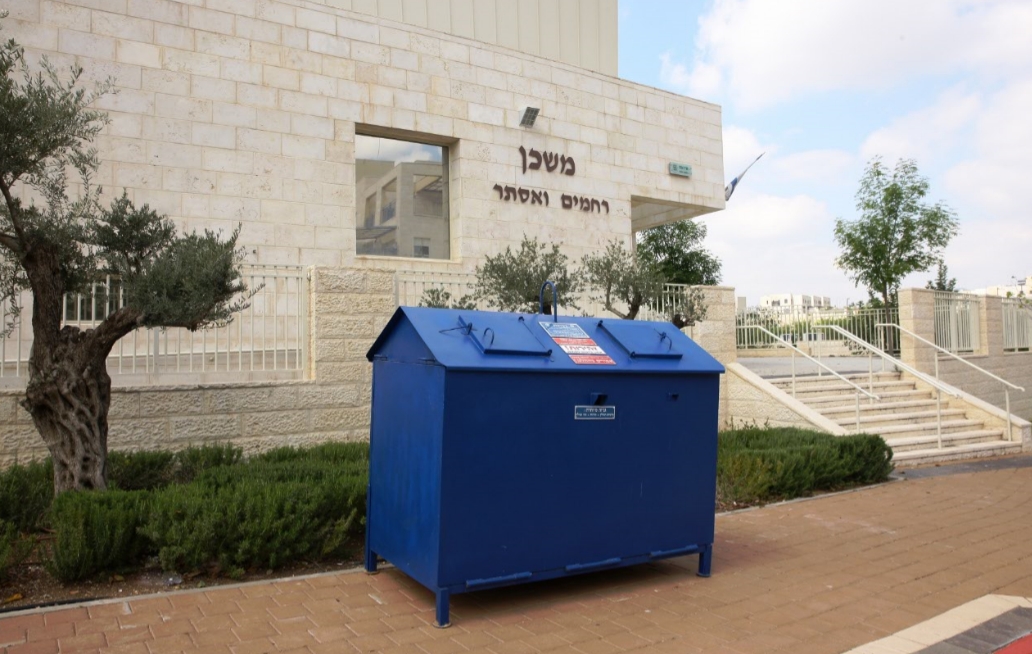 Standard Geniza Facility
Standard Geniza FacilityHe then pauses to mention the well-known shtiblach in the Beit Vagan neighborhood called 'Amshinov', where the public used to bring an unimaginable amount of geniza, and the beadle didn’t know what to do with them. The volume only increased over time, as in the past decades, the printing industry was not sophisticated, and naturally, the geniza volumes were smaller, but as printing evolved, the volumes grew larger.
"The geniza issue was raised in that gathering, and I immediately decided to take on the mission and find a solution. This also came thanks to the influence of my father, Rabbi Yisrael Bundheim, of blessed memory, who was known for his sensitivity to the geniza topic. I remember him coming to me once, telling me about a shoemaker who asked what he should do with an ancient Humash he found outside, on the road. I can't describe how much this saddened my father."
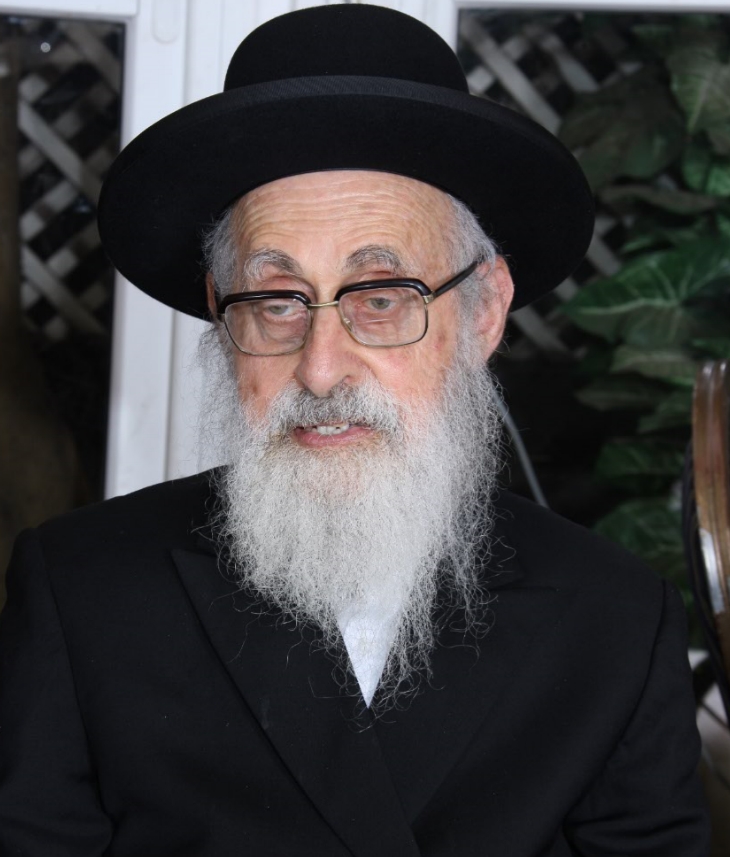 Rabbi Yisrael Bundheim z
Rabbi Yisrael Bundheim zIn the early stages, Rabbi Bundheim recalls meeting another person who participated in the same gathering, and together they initiated the revolutionary idea called 'Geniza Facilities'. These are those units found outside synagogues in most cities, designed to store geniza. "The first facility we installed was in Beit Vagan, and it was essentially the first geniza facility in the world. At that time, a reporter from the 'Erev Shabbat' newspaper lived on the same street, photographed the facility, and the image was published in the newspaper. This led to requests from six other neighborhoods in Jerusalem for their own geniza facilities, and from there, the initiative expanded beyond Jerusalem."
 Illustrated Geniza Facility
Illustrated Geniza Facility"On one occasion," he recalls, "a dear Jew living in a Tel Aviv neighborhood asked for a geniza facility at his synagogue. But as back then, recycle bins weren’t as common as today, putting them in a synagogue seemed odd. The beadles refused, but the man had no choice but to place the facility in his own yard... It took many years for these facilities to become part of local neighborhoods."
The Strength Comes from My Father
Of course, merely placing geniza facilities doesn't provide a complete solution to the serious issues of sacred texts, but it offers an honorable interim station for storage. "Next, we had to think about what to do with the vast amounts of geniza accumulated in our facilities. Initially, we dug large pits and buried them, but as the volumes continued to rise, we quickly realized that the pits filled up quickly. At that time, we received significant divine assistance and managed to arrange with the national burial system to bury the writings in inactive quarries. We needed approval from the Ministry of Environmental Protection, as unused paper is typically recycled, not buried. Still, with much help from Rabbi Neuwirth, author of 'Shemirat Shabbat Kehilchata', and MK Verdiger from the Poalei Agudat Yisrael, we got the necessary permits."
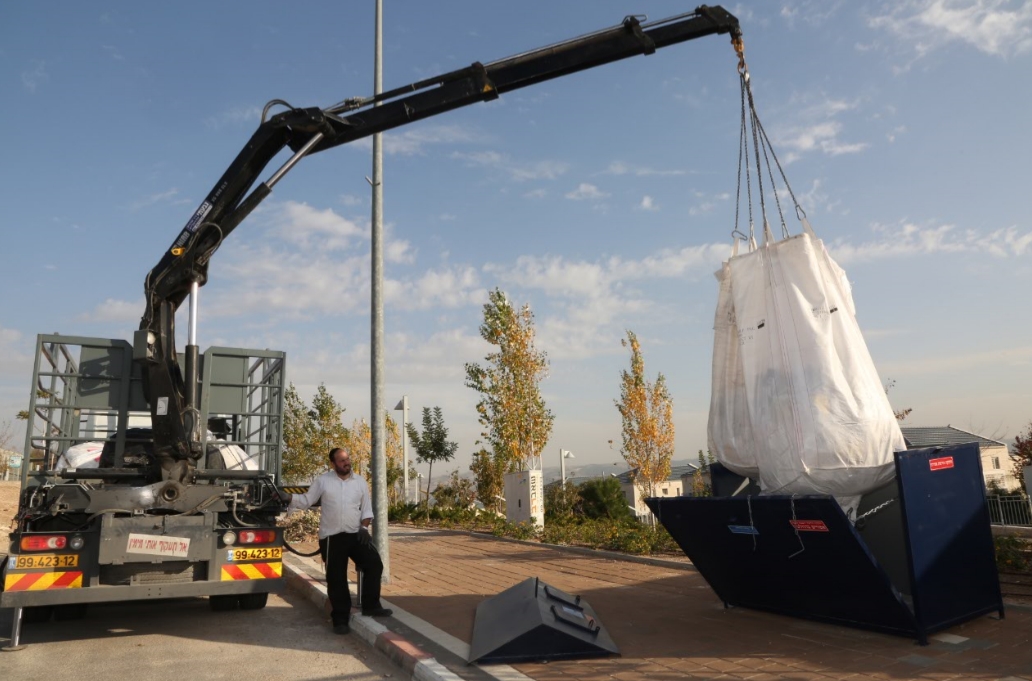 Geniza Collection by Truck
Geniza Collection by TruckAlthough the organization initially operated with a small private vehicle and a volunteer driver collecting geniza from facility to facility, Rabbi Bundheim soon understood the need for a larger vehicle. "We quickly transitioned to using a pickup truck, and in recent years, we have been using trucks with cranes. Today, we have three trucks roaming different areas of the country. Of course, the work is very hard, especially since the fees we ask people to contribute for geniza don’t cover the costs but only the running expenses. However, we received guidance from Rabbi Chaim Kanievsky to only request a nominal fee to prevent financial barriers from keeping people from preserving sacred texts."
What gives you strength in such demanding work?
"My father," he replies, "My father is a Holocaust survivor and for many years was a Rosh Yeshiva at Yeshivat Kol Torah. The geniza topic always troubled him, and he was involved in rescuing sacred texts. When I got involved, he was delighted. I remember once, during a moment of difficulty, telling him: 'Enough, Dad, I've reached my limit. I want to leave this work.' But he wouldn't hear of it, insisting: 'He who begins a mitzvah is told to finish it.'"
Concerned About Geniza? Know the Halacha
Beyond providing solutions for existing geniza, Rabbi Bundheim and his father have made significant strides, initially seen as futile, to raise awareness. "We started making efforts to raise awareness about the prohibition of writing verses or parts of verses in advertisements, wedding invitations, street notices, and the like," he says. "Our goal is to protect the sacred names from disgrace. Many advertisers wanting to tap into the ultra-Orthodox community thought using verses or Talmudic sayings in their ads would work. We began visiting advertising agencies, explaining how it's forbidden, since when a verse, or even part of it, is published, it gains sanctity and requires preservation."
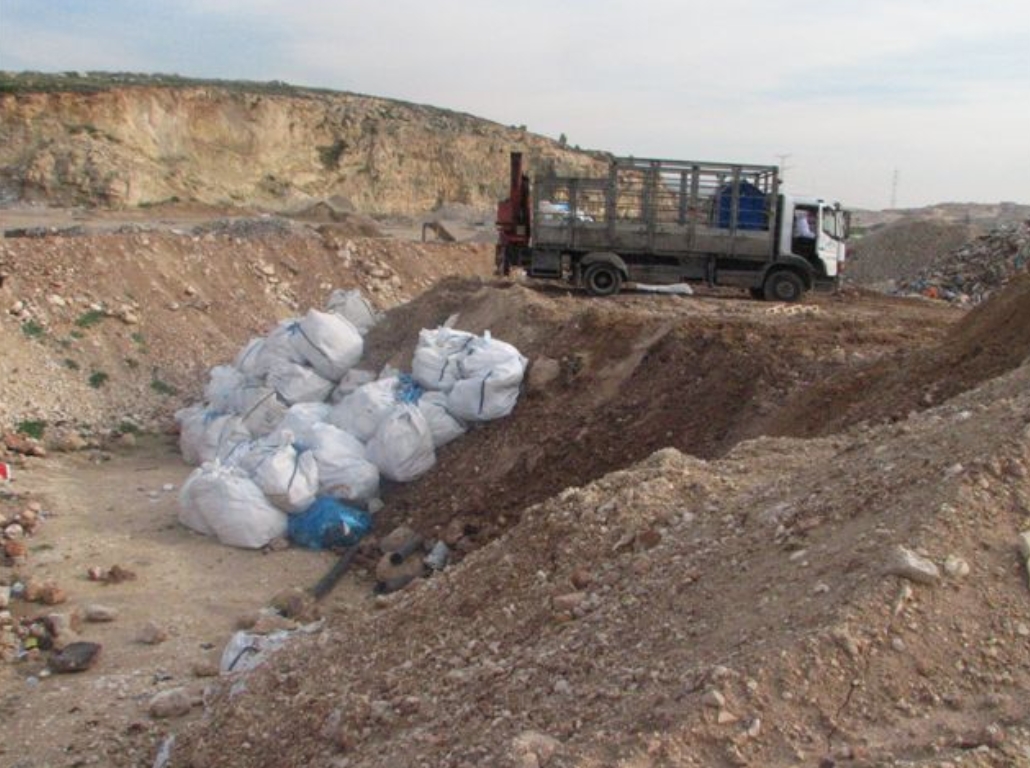 Truck unloading sacks at burial site
Truck unloading sacks at burial siteWhat exactly do you mean?
"In general, for words to be considered a verse, two conditions must be met: First, the words must appear as they do in the original verse, and second, there must be the verse's meaning. For example, if someone includes 'cool water on' in an advertisement, there's no issue because it doesn't convey a verse's meaning, suggesting it's about 'cool water on the table'. But even just two words can establish meaning, like writing 'do not steal'. Although not a whole verse, it poses a halachic problem.
"Even after recognizing a verse's meaning, attention must be paid to whether it's intended as a verse or merely as a phrase or narrative. For instance, if a newspaper writes that a certain rabbi entered a hall and the public sang, 'Days... add,' it serves as a narrative, not a quotation, hence no issue. Or if the top of a condolence notice reads 'the crown falls', it's a verse from Lamentations about the destruction of the Temple, but here it's clearly an expression of mourning, not a verse citation."
The Good News: Awareness is Rising
"The boundaries in this matter are very thin," emphasizes Rabbi Bundheim, "so with any question, it's important to check and consult. There's also a simple way to be clever—modify the verse, such as changing word order, like writing 'be very careful for your souls' instead of 'you shall greatly take care', which avoids quoting a verse. Or change singular to plural, or vice versa, like writing 'blessings for the overseer's head' instead of 'a blessing'. Writing 'blessed are those who come in Hashem's name' instead of 'blessed is he who comes' also avoids issues."
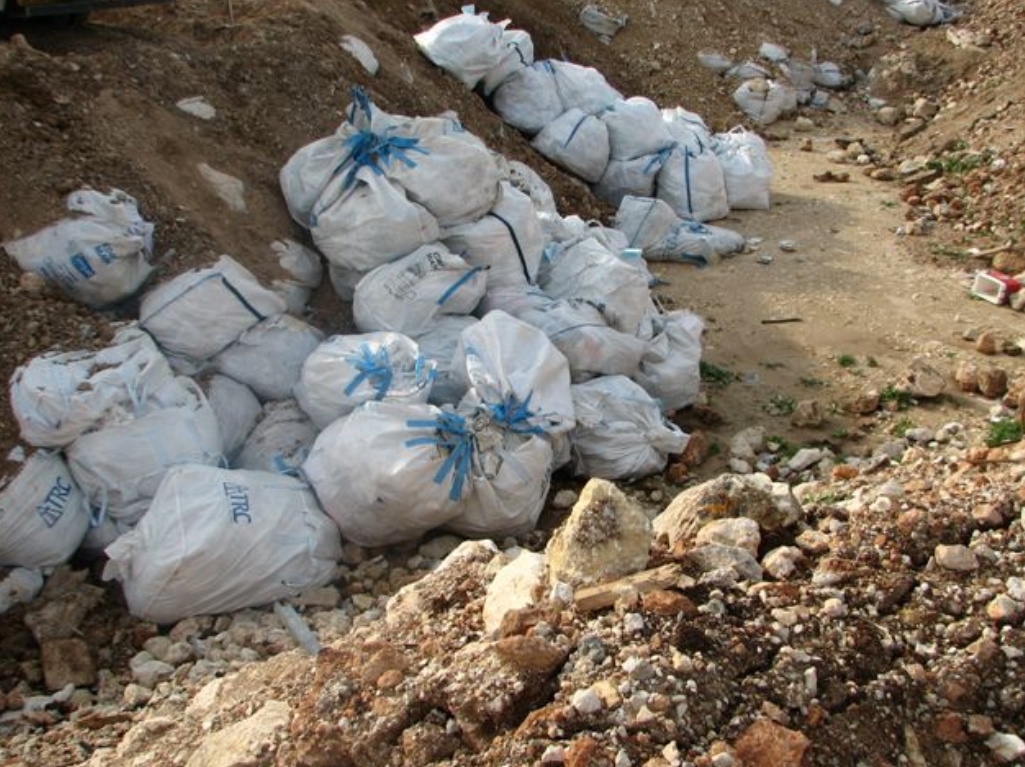 Geniza sacks at burial site
Geniza sacks at burial siteRabbi Bundheim adds: "I heard a very interesting halacha from Rabbi Elyashiv z"tl. He stated there's also sanctity in the Oral Torah. Therefore, even booklets of children's biblical stories, with no quotes but since it's how children learn righteous stories, require geniza. Even a writer weaving a story around one halacha, though not holy itself, requires geniza because the whole piece aims to teach the halacha, it's how children are taught."
Over the years, Rabbi Bundheim realized many photographers and graphic artists, sometimes unknowingly, publish ads with Hashem's name. For instance, pictures of synagogues displaying 'I have set the Hashem' on the cantor's stand or tombstones at righteous graves can include divine names. These images make their way into publications, leading to mistakes within the community. "Another common example is when people host family celebrations and print grace before meals. Often, many remain on the tables, and non-Jewish waiters, not understanding, toss them out."
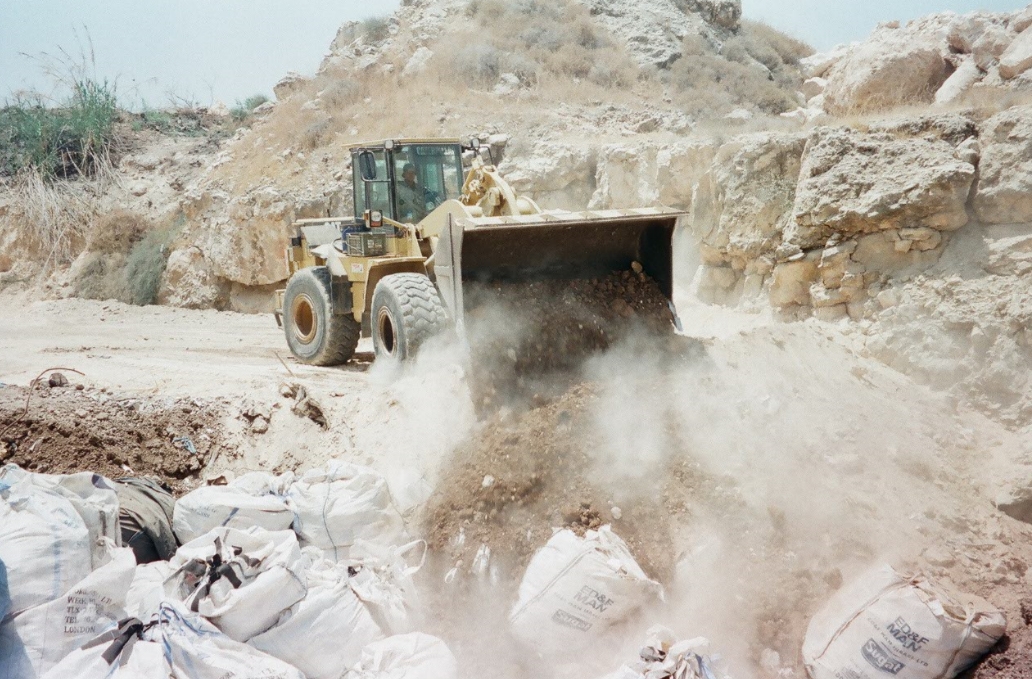 A tractor covers the sacks
A tractor covers the sacksIn recent years, Rabbi Bundheim has begun responding to questions via e-mail. Although numerous, he patiently addresses each. He recalls a particularly satisfying moment: "Every year, we operate on Lag B'Omer in Meron to prevent geniza issues. We often find major organizations distributing flyers with advertisements and Psalms or prayers on the other side, which in the mass of people, end up on the ground, trodden underfoot on the way to Rabbi Shimon Bar Yochai's grave, dishonoring sacred names. In recent years, we fought hard against this; this year, it proved effective. Almost no companies distributed such materials, and when they did, people simply refused them. I'm confident we have achieved something important."
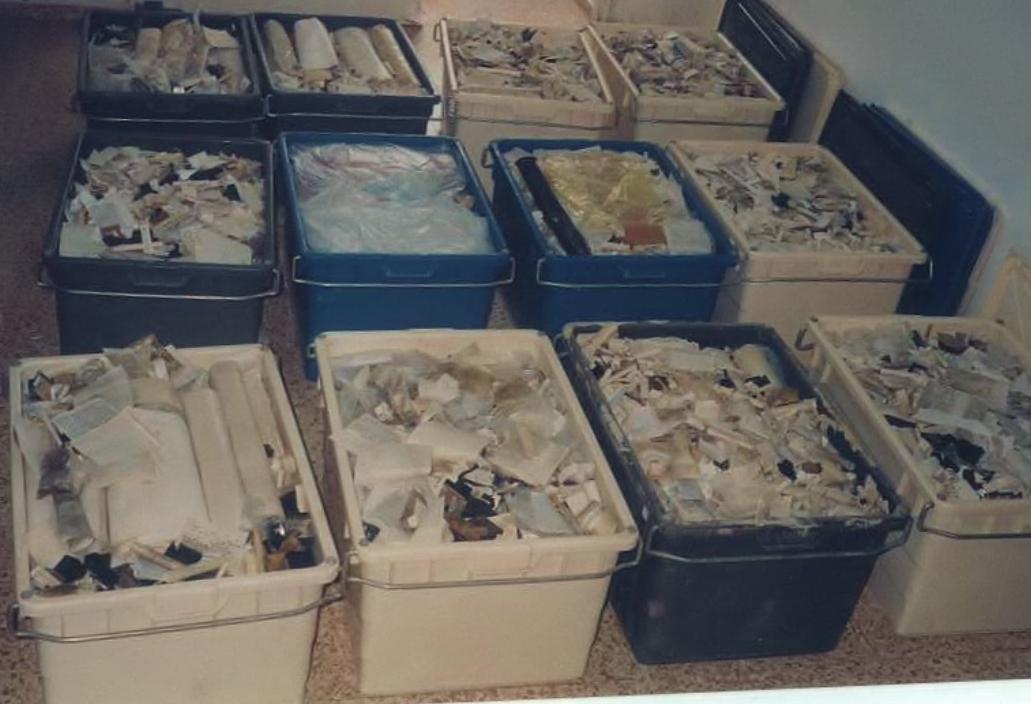 The scrolls sorted and ready for burial
The scrolls sorted and ready for burial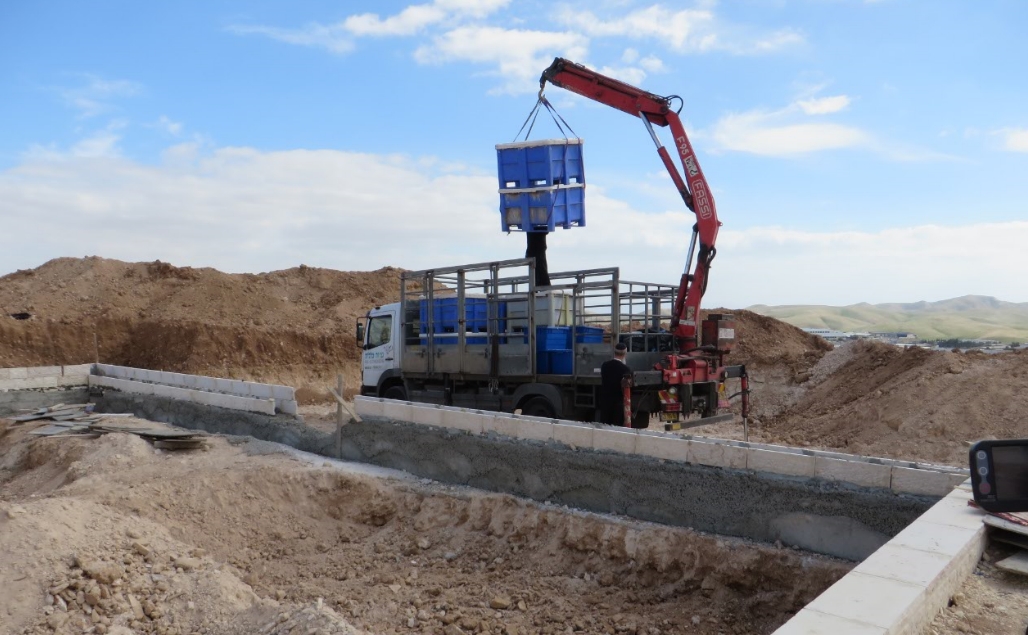 Scroll clay pots unloaded at cemetery corner
Scroll clay pots unloaded at cemetery corner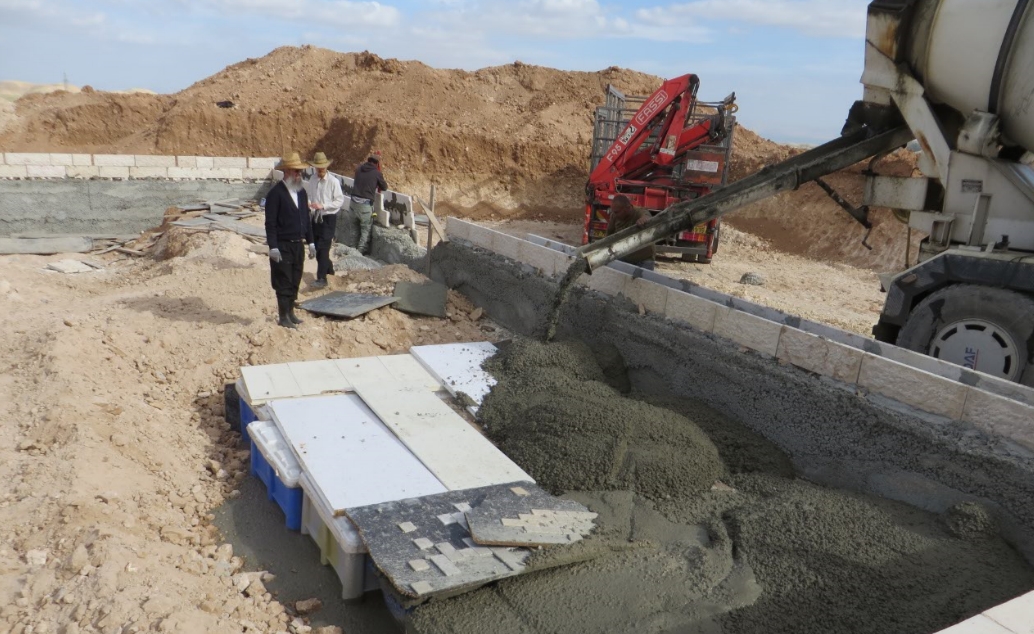 Scroll jars covered with cement
Scroll jars covered with cementYou may send questions on geniza topics to Rabbi Bundheim via email: office@gniza.org.il. Questions will be answered, God willing, within a few days.

